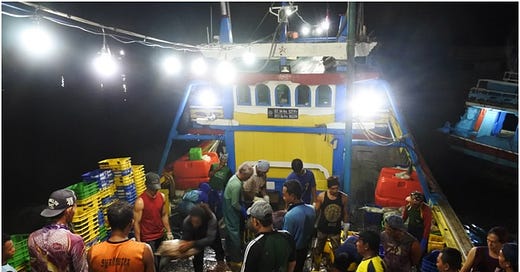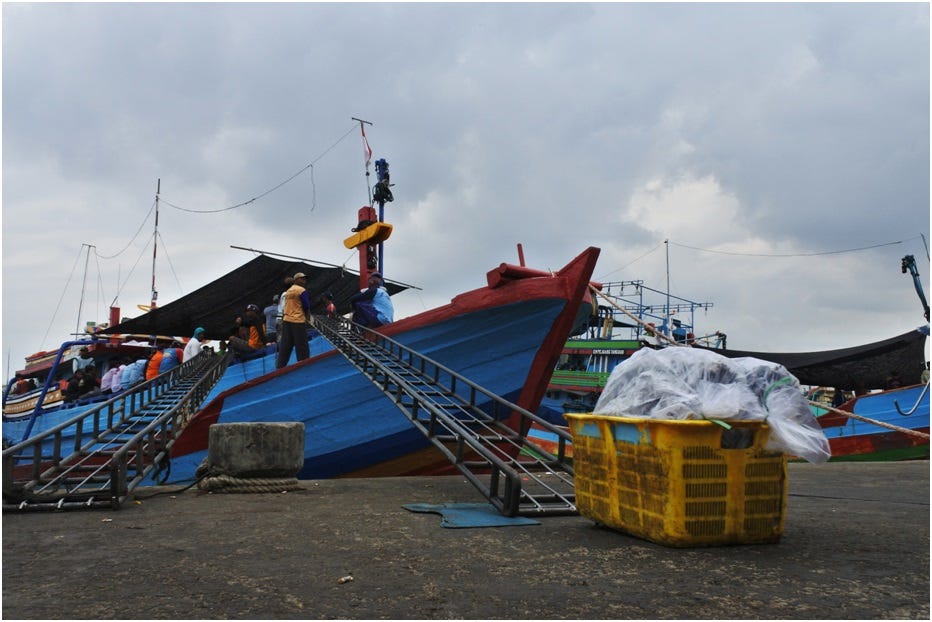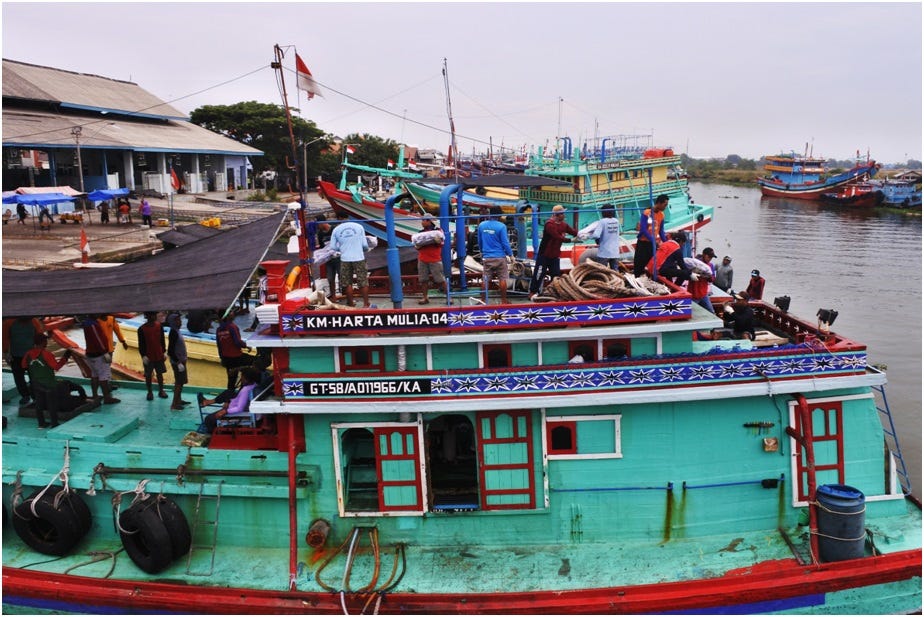By: Ainur Rohmah
The sun was gaining strength when Rofani solemnly performed a religious ritual on his ship the KM Sari Rukun, docked at a harbor in Batang Regency in Central Java. The 37-year-old fisherman crouched while chanting prayers on the ship's bridge, his hand holding a bowl of offerings made of spices which he would later sprinkle around the ship. His fellow fishermen prayed on the hull of the ship, which would take them to the Bawean waters in the Java Sea, daring increasingly unpredictable and dangerous seas as climate change roils the waters.
Rofani said the progressively erratic weather has made the fishermen more alert and more mature in preparing themselves before going to sea.
"We usually perform this ritual before going to sea," he said. "Hopefully that all goes well and we can return home safely." As climate change intensifies, driving p the temperature of the sea, he and his fellow fishermen face an increasingly dangerous world.
Nonetheless, as they have for centuries, men continue to go. Nearly 200 kilometers from Batang Harbor, Mohamad Hadi Susilo also checked equipment on his ship at Juwana Harbor before going to sea for the waters of the 250,000 sq. mi. Arafura Sea the next day. He said his crew was very busy preparing supplies on board, including fuel, food and blocks of ice to preserve fish. They were also ensuring that equipment such as the Global Positioning System (GPS), fish finder, nets, machines and safety equipment are available and functioning properly.
"The Arafura Sea is famous for being fierce. So you have to be prepared with all possibilities," said Hadi. With his colleague Dimas Bagaskara and dozens of crew, Hadi will go to sea in the Arafura waters for the next six to eight months, leaving his family in his hometown of Pati, more than 2,700 kilometers from Arafura. Like Hadi, Dimas has been looking for fish in Arafura for seven years. His catch is pelagic fish such as tuna, skipjack and mackerel, which are then exported to countries in Asia. "I'm not in high school. This job is what I think can make me rich quickly," said Dimas.
But it probably won’t. As many as 11.34 percent of people in Indonesia's fisheries sector are classified as poor, according to the science news website phys.org, a higher rate than in other sectors such as restaurant services, building construction and waste collection. As a result, Data from the Indonesian Statistics Bureau (BPS) show a steady decline in households involved in the profession, from 2 million in 2000 to 966,000 in 2016.
All of these fishermen feel the changes in the sea, with the weather getting more erratic. Nor is finding fish as easy as it once was. Talk among fishermen is that the changing weather is due to the climate crisis, which is raising the temperature of the sea. "So the situation at sea is completely uncertain. When I was an early fisherman, everything went smoothly. Even if there were big waves, it usually only lasted a week or two, but now (big waves) can last for a whole month," he said.
Etty Riani, an expert in fisheries resource management from the Bogor Agricultural University, said the climate crisis has triggered a rise in sea levels, water temperature and acidification. This affects the sustainability of fishery production and the carrying capacity of the ecosystem. Rising seawater temperatures interfere with the reproduction and regeneration of fish, which also tend to move to deeper, cooler locations. This results in catch areas moving and tending to be further away than usual. "It is not surprising that fishermen now often complain that their catch is smaller," said Dr. Etty. "And also fishermen have to sail further from their catch areas because of fish migration."
Bleaching due to climate change and destructive fishing activities has also disrupted coral reef ecosystems and other marine biota, which in turn affects the number of fish the sea can carry, Etty said.
Dwikorita Karnawati, the head of the Meteorology, Climatology and Geophysics Agency (BMKG), agreed, saying said the sea is warming, 29 degrees centigrade, whereas previously it hovered 25-26C°. This has resulted in more frequent high waves and tropical storms, which have raised the risk of accidents at sea and made it more difficult for fishermen to find fish.
Dwikorita said her institution is aware of the latest developments regarding the impact of the climate crisis on the lives of fishermen and farmers, including that they can no longer rely on 'ilmu titen,' their sensitivity to the sea, to read nature's signs. “Ilmu Titen is already very difficult to be used as a reference. The current weather and climate are very dynamic and difficult to predict,” said Dwikorita.
Climate change has disrupted climate and weather regulation in Indonesia and has had a serious impact on the sustainability of the agriculture and fisheries sector, which can lead to threats to food security. BMKG predicts that extreme weather will occur more frequently with longer duration, including heavy rains accompanied by lightning and thunder, tropical cyclones, high waves, hail and droughts.
Responding to those matters, BMKG for the past few years has held what is called a "Climate School" as an effort to equip fishermen and farmers with knowledge about the growing crisis and how to deal with it. The Ministry of Maritime Affairs and Fisheries in collaboration with a service provider company PT XL Axiata Tbk also launched an application called "Laut Nusantara" to make it easier for fishermen to catch fish.
But for traditional fishermen like Dimas, it takes time to adapt to new changes, such as how he must understand issues related to climate and how to use high-tech tools. "Thinking that is difficult is exhausting for me," said Dimas, who only graduated from elementary school. Equipment such as GPS and fish finders, he says, are sophisticated enough to help fishermen go to sea. GPS helps fishermen to know the position of ships on the high seas, determine travel routes and mark important places such as areas with a lot of fish. With a fish finder, fishermen can find out information on the presence of fish, underwater topography and sea depth.
"We are used to using these tools. So we don't feel the need to use anything else," he said. "Nevertheless, sophisticated equipment is useless if the weather is not friendly."
But Sugeng Nugroho, an administrator for the Indonesian Traditional Fishermen Association (KNTI), said most fishermen realize that the current situation is increasingly unfavorable. A quick response is needed, but often some fishermen —whether because of low education or because of limited access to information— don't know how to solve the problem. To participate in government programs such as climate schools, for example, some fishermen do not know the procedures. For those used to using traditional methods such as ilmu titem, it is quite difficult to switch to scientific-based data and information such as predictions of rainfall, air temperature, humidity, wind direction and speed. Also to use new technologies such as fish finder apps that have to be installed on their phones, they don't know how.
"This is also a matter of mindset," said Sugeng. "Many fishermen think bad weather and other things they face at sea are just their risks. So they just accept it," he said. However, he urged the government, especially the Ministry of Maritime Affairs and Fisheries (KKP) to consistently implement laws concerning the protection and empowerment of fishermen, fish cultivators and salt farmers. The regulation states that one of the challenges for those working in the fisheries sector is climate change. The law also mandates that the government is obliged to protect them from the risk of natural disasters, climate change, and pollution. He hopes that the government will provide safety guarantees for fishermen, such as providing insurance, and continue to socialize disaster mitigation while at sea.
"We don't want more and more fishermen to die while at sea, or that they change professions because of the various obstacles they face. Therefore, we must not tire of trying so that they can still go to sea safely with a good result," said Sugeng.
Ainur Rahmah writes regularly for Asia Sentinel. This was made possible by a grant from the Arafura and Timor Seas Ecosystem Action Program (ATSEA). Part 1 appeared on October 5. Photos by Dhani Setiawan






Fishermen care more about the climate hoax’s effect on fuel costs. Look no further than who funded your article to show why this trash reporting was written with such bias.